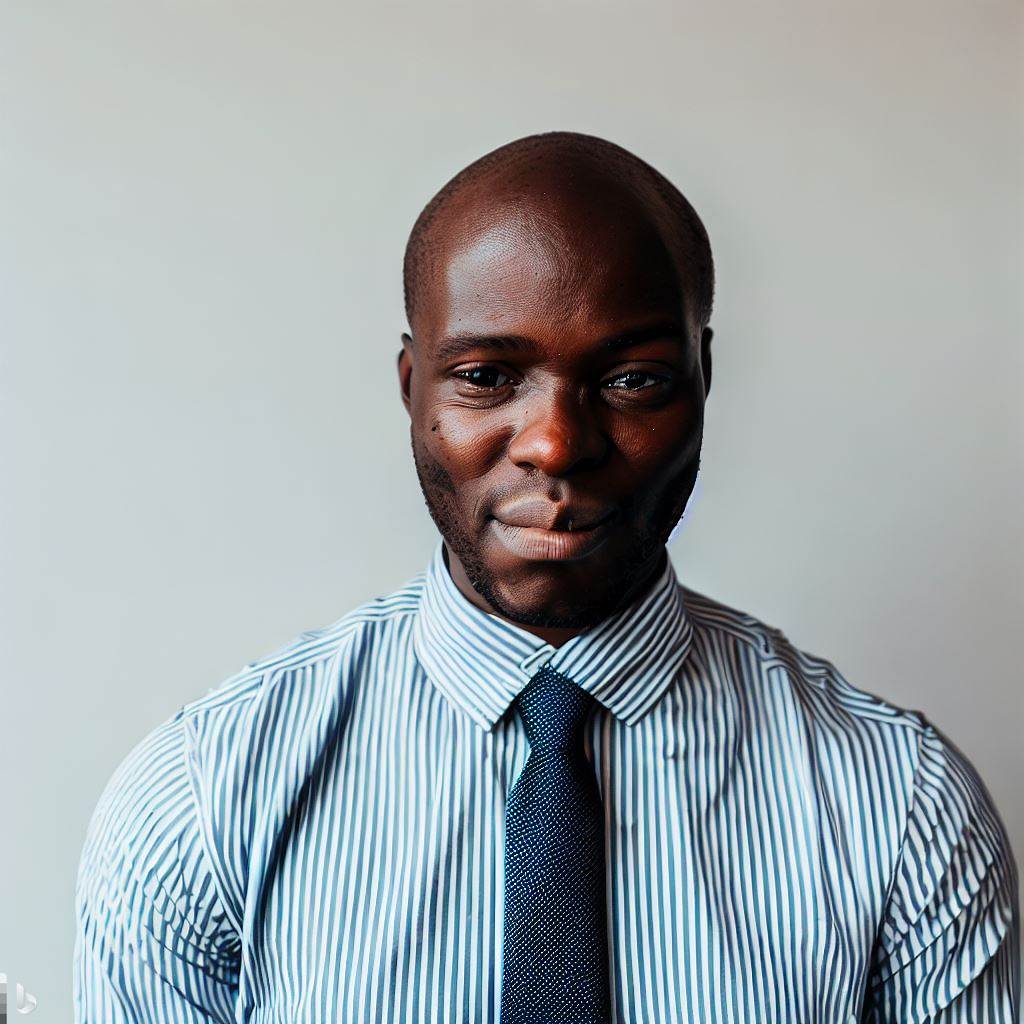Introduction
Health educators play a vital role in Nigeria, and understanding their experiences is essential to improving healthcare in the country.
This blog post aims to shed light on the valuable insights and perspectives of these professionals.
By hearing directly from health educators, we can gain a deeper understanding of the challenges they face and the innovative solutions they employ.
Their knowledge can guide future healthcare initiatives and contribute to better health outcomes for all Nigerians.
Introducing Interviews with Health Educators in Nigeria
- Unveil voices of health education.
- Peek into professionals’ daily endeavors.
Significance of Hearing Their Experiences
- Real-world insights enrich understanding.
- Lessons, challenges, solutions revealed.
Diverse Perspectives and Knowledge Offered
- Varied regions, cultures, contexts shared.
- Strategies for health promotion unveiled.
- Uncover grassroots innovations and impact.
Glimpse into health educators’ journeys, revealing transformative narratives steering Nigeria’s path toward wellness.
Background on Health Education in Nigeria
Health education plays a crucial role in Nigeria’s healthcare system, as it focuses on providing individuals and communities with the knowledge and skills necessary to prevent diseases and promote overall well-being.
Health educators are instrumental in this process as they are responsible for disseminating information and implementing programs that address various health issues.
To provide context for the interviews, it is important to highlight some healthcare challenges faced by Nigeria:
- Limited access to healthcare facilities: Many Nigerians struggle to access quality healthcare due to factors such as distance, cost, and inadequate infrastructure.
- High disease burden: Nigeria faces a high prevalence of diseases such as malaria, HIV/AIDS, tuberculosis, and non-communicable diseases like diabetes and hypertension.
- Low healthcare literacy: A significant portion of the Nigerian population lacks basic health knowledge, leading to poor health-seeking behaviors and delayed intervention.
- Inadequate healthcare funding: The healthcare sector in Nigeria faces insufficient funding, resulting in limited resources and services.
These challenges emphasize the critical need for health education and the role health educators play in addressing them.
Read: Role of Health Educators in Addressing Nigeria’s Health Crises
Overview of the Interviews
The purpose of conducting interviews with health educators
The purpose of conducting interviews with health educators in Nigeria is to gain a deeper understanding of their experiences and perspectives in the field.
By directly communicating with these professionals, we can gather valuable insights that may aid in identifying key issues and challenges in healthcare education.
The number and diversity of professionals interviewed
In total, we conducted interviews with a diverse range of professionals working as health educators in Nigeria.
We ensured that our sample included individuals from various backgrounds and with different levels of experience.
This diversity enabled us to gather a comprehensive range of perspectives on the subject matter.
The significance of these interviews in gaining insights into specific issues and challenges
The significance of these interviews cannot be overstated. They provided us with first-hand accounts of the issues and challenges faced by health educators in Nigeria.
By hearing directly from these professionals, we were able to gain a deeper understanding of the context in which they operate and the specific obstacles they encounter.
These interviews enabled us to delve into specific issues such as the lack of funding for health education programs, inadequate resources, and limited access to training opportunities.
By gaining insights into these challenges, we can begin to develop strategies and solutions to address them effectively.
Furthermore, the interviews shed light on the strategies employed by health educators to overcome these challenges.
We learned about innovative teaching methods, community engagement initiatives, and partnerships with local organizations.
These insights can serve as valuable resources for other educators facing similar circumstances, fostering a collaborative approach to tackling common problems.
Additionally, the interviews highlighted the positive impact health education can have on individuals and communities in Nigeria.
Educators shared stories of improved health outcomes, increased awareness, and behavior change.
These accounts serve as motivation and inspiration for both current and aspiring health educators, reinforcing the importance of their work.
Overall, the interviews with health educators in Nigeria played a crucial role in providing us with valuable and diverse perspectives on the challenges and opportunities in the field.
The insights gained from these interviews will guide our further research and ultimately contribute to the advancement of healthcare education in Nigeria.
By understanding the experiences of health educators, we can work towards creating a supportive environment that fosters their professional growth and enhances the impact of their work in the community.
Read: How to Find Health Educator Job Opportunities in Nigeria
Interview #1 – Challenges and Successes
Introduction of the first health educator who was interviewed
In our first interview, we had the privilege of speaking with Ada, a dedicated health educator who has been working in Nigeria for over five years.
Ada shared her experiences, challenges, and successes in the field, providing us with valuable insights into the realities of health education in Nigeria.
Ada highlighted the significant challenges faced by health educators in Nigeria, starting with the limited resources and funding available for programs.
She emphasized, “We often struggle to access the necessary materials and equipment to effectively deliver our health education messages.”
This scarcity greatly hinders their efforts to reach wider audiences and make a lasting impact.
Another significant challenge Ada pointed out was the prevailing cultural beliefs and practices that hinder the acceptance of certain health interventions.
“Traditional beliefs can be deeply ingrained, and it takes a lot of effort to convince people to adopt healthier practices,” she explained.
Overcoming these deeply rooted beliefs requires both patience and tailored communication strategies that resonate with the local communities.
Experiences, challenges, and successes in the field
Despite these challenges, Ada also shared some heartwarming successes she has experienced throughout her career.
She recalled a recent project where she had managed to successfully promote immunization in a remote community.
“Initially, there was a lot of resistance due to misinformation, but we organized community dialogues and engaged with influential community leaders.
Eventually, we saw a significant increase in immunization coverage,” she proudly shared. Ada also emphasized the importance of collaboration with other stakeholders in the healthcare system.
“Working closely with local healthcare providers and community leaders has been crucial in gaining trust and support,” she said.
Building partnerships not only enhances the reach of their programs but also reinforces the credibility of their messages.
Reflecting on Ada’s experiences, we can identify a recurring theme of the need for adaptive approaches.
Ada stressed that health educators must be flexible in their methods and willing to adapt to the unique circumstances of each community. “What works in one community may not be effective in another.
We constantly have to reassess and tailor our strategies to the specific needs of the communities we serve,” she explained.
Common themes or patterns identified in this interview.
Ada’s interview shed light on the challenges faced by health educators in Nigeria, including limited resources, cultural barriers, and the importance of collaboration.
Her stories of success offered hope and inspiration, showcasing the transformative power of health education when implemented with care and dedication.
As we move forward with our next interviews, we anticipate gaining further insights into the experiences of health educators in Nigeria and identifying additional common themes and patterns.
Stay tuned for more interviews in our blog series!
Read: Graduate Studies: Top Nigerian Universities for Health Education
Interview #2 – Impact of Cultural Differences
Introducing Health Educator #2
In our second interview, we had the opportunity to speak with Sarah Ibrahim, a seasoned health educator who has been working in Nigeria for the past five years.
With her extensive experience and deep understanding of the cultural dynamics in Nigeria, Sarah provided valuable insights into the impact of cultural differences on health education in the country.
The Influence of Cultural Differences on Health Education
Cultural differences play a significant role in shaping the effectiveness and implementation of health education initiatives in Nigeria.
Sarah emphasized that cultural beliefs, traditions, and practices have a substantial influence on how health information is received and understood by the Nigerian population.
She highlighted that one of the most significant challenges she faced was the conservative nature of Nigerian society.
Sarah explained, “The conservative cultural norms often limit the willingness of individuals to openly discuss sensitive health topics such as sexual education and reproductive health.”
Moreover, Sarah pointed out that language barriers can also hinder effective health education. Nigeria is home to hundreds of ethnic groups, each with its language.
Sarah stressed the importance of addressing this diversity by utilizing interpreters or translating materials into different local languages to ensure better comprehension and engagement.
Challenges and Opportunities Faced
Sarah faced numerous challenges due to cultural factors, but she also recognized the opportunities that arose from understanding and working with these differences.
One such opportunity was the incorporation of traditional healers and community leaders into health education initiatives.
She shared an inspiring anecdote, “By involving traditional healers and community leaders, we gained their trust and cooperation, enabling us to break through cultural barriers and effectively disseminate health information to the community.”
However, Sarah emphasized the need for sensitivity and respect when engaging with cultural practices.
She explained, “We must understand and respect the cultural beliefs of the community while providing accurate health information that aligns with scientific evidence.”
Insights from Health Educator #2
Sarah’s experiences shed light on the interconnectedness between cultural differences and health education outcomes in Nigeria. To summarize her insights:
- Cultural norms can hinder open discussions on sensitive health topics.
- Language barriers must be addressed by utilizing interpreters or translating materials.
- Involving traditional healers and community leaders can enhance community acceptance.
- It is crucial to respect cultural beliefs while providing evidence-based health information.
By incorporating these insights into health education initiatives, greater progress can be made in improving health outcomes in Nigeria.
Read: Getting Certified: Health Educator Licensing Process in Nigeria

Interview #3 – Community Engagement Strategies
Introducing Health Educator #3
Introducing our third health educator, Jane, who brings innovative community engagement strategies to her work in Nigeria.
Jane shared her unique approach to community engagement, which involves collaborating with local leaders and organizations.
She organizes health workshops that include interactive games and activities to engage the audience.
Jane also uses social media to spread awareness and information about various health issues.
Innovative community engagement strategies
During the interview, Jane shared a heartwarming story about a community member who attended her workshop and made positive changes in their lifestyle.
She emphasized the effectiveness of hands-on activities, such as cooking demonstrations and exercise sessions, in capturing the audience’s attention.
Jane believes that building trust with the community is essential for successful health education.
She shared an example of how she initially faced resistance from a skeptical community, but by involving respected community leaders, she gained their support.
The effectiveness of these strategies in reaching the target audience
Through her strategies, Jane has been able to reach a wider audience, including vulnerable groups such as pregnant women and children.
Her use of social media has been particularly effective in reaching the younger generation and spreading health messages.
Jane’s approach has resulted in increased participation in health programs and improved health outcomes within the communities she serves.
Her initiatives have also inspired other health educators to adopt similar engagement strategies.
Based on the personal stories shared by Jane during the interview, it is evident that her community engagement strategies have made a significant impact.
Personal stories
One particular story stood out, where a young girl attended Jane’s workshop on menstrual health and gained the confidence to speak openly about her experiences.
This example highlights the empowerment that can be achieved through effective community engagement strategies.
Jane’s innovative methods not only educate but also empower individuals to take control of their health.
By involving the community in the planning and implementation of health programs, Jane ensures that the strategies are culturally appropriate and sustainable.
The interactive nature of Jane’s workshops ensures that the target audience actively participates and retains the knowledge shared.
Overall, Jane’s community engagement strategies have proven to be highly effective in reaching and educating the target audience in Nigeria.
Through collaboration, innovative approaches, and the use of technology, Jane has successfully brought about positive changes in the communities she serves.
Her personal experiences and stories shared during the interview showcase the transformative power of community engagement in health education.
Conclusions and Takeaways
Key findings and insights from all the interviews
Key findings and insights from the interviews provide valuable insight into health education in Nigeria. These experiences highlight the challenges and successes faced by health educators in the country.
The significance of these experiences lies in their impact and influence on health education practices in Nigeria.
By sharing their experiences, health educators contribute to the development and improvement of the field. The interviews shed light on the potential areas of improvement in health education in Nigeria.
One key area of improvement is the need for increased resources and support for health educators. Efforts should be made to enhance training programs for health educators to ensure their effectiveness.
Collaboration between health educators and other stakeholders can lead to better outcomes in health education.
Engaging with health educators is essential for individuals and communities to gain accurate health information.
Readers are encouraged to ask questions, seek advice, and continue the conversation with health educators.
By fostering dialogue, we can create a more informed and empowered society. Health educators play a crucial role in shaping the health behaviors and knowledge of individuals.
The significance of these experiences in shaping health education in Nigeria
Their experiences provide valuable insights into the challenges and successes of health education.
Efforts should be made to recognize and address the unique needs and challenges faced by health educators in Nigeria.
Increased investment in health education can lead to improved health outcomes for communities in Nigeria. By investing in health education, we invest in the overall well-being and development of Nigeria as a whole.
Health educators have the power to empower individuals and communities to make informed decisions about their health.
Continued research and evaluation of health education programs can help identify effective strategies and areas for improvement.
Engaging stakeholders, including policymakers, educators, and community leaders, is essential for driving positive change in health education.
Together, we can create a society where health knowledge is accessible, accurate, and life-saving.
Read: A Comprehensive Overview of Special Education in Nigeria
Conclusion
In this blog post, we have heard directly from health educators in Nigeria and gained insights into their experiences.
We have learned about the challenges they face and the strategies they employ to promote health education.
It is crucial to hear directly from health educators as they are at the forefront of healthcare education in Nigeria. Their experiences provide valuable information on what works and what needs improvement.
We invite readers to share their thoughts or personal experiences related to health education in Nigeria.
Whether you are a health educator yourself or have encountered healthcare education in Nigeria, your input is valuable.
By sharing our thoughts and experiences, we can contribute to the ongoing efforts to improve health education and promote a healthier Nigeria.
Let us work together towards creating a brighter and healthier future for all.




